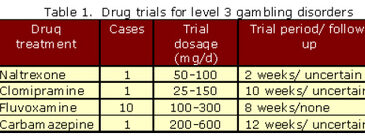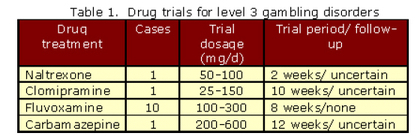Forthcoming research suggests that naltrexone, developed in 1994 to treat heroin addiction and approved in 1995 to treat alcoholics, might be effective in reducing symptoms associated with pathological (level 3) gambling disorders (Kim et al., in press). These preliminary findings replicate others showing that naltrexone diminishes gambling urges of level 3 gamblers (Kim, 1998). The success of other drugs in treating level 3 gambling disorders, however narrow, should not be overlooked.
According to Hollander, Buchalter, and DeCaria (2000), selective serotonin reuptake inhibitors (SSRI’s) and mood stabilizers have shown limited promise in treating level 3 gamblers. For example, a case study of a 31 year-old woman with a twelve-year history of level 3 gambling showed that the SSRI clomipramine is effective in decreasing gambling and gambling-related urges (Hollander et al., 1992). Specifically, throughout a ten-week treatment period within which clomipramine was administered, the gambling behavior of the study’s twelve-year level 3 gambler decreased by 90% (Hollander et al., 1992). Additionally, in a single-blind study, seven out of ten level 3 gamblers responded positively to the SSRI fluvoxamine (Hollander et al., 1998). These seven pathological gamblers were abstinent upon termination of an eight-week treatment period preceded by eight weeks of placebo treatment establishing baseline gambling behavior[1] (Hollander et al., 1998).
The mood stabilizer carbamazepine proved clinically beneficial for a level 3 gambler in a double-blind, placebo-controlled twelve-week study (Haller & Hinterhuber, 1994). Such benefits were consistent throughout an additional thirty-month maintenance period. Moskowitz (1980, in Hollander et al., 2000) discovered that lithium is effective in treating level 3 gamblers who present with comorbid mood disorders. Research continues on lithium treatment of bipolar level 3 gamblers (Hollander et al., 2000). Table 1 summarizes design and procedural attributes of some recent drug treatments trials.
Future research on pharmacological treatments for level 3 gambling disorders must avoid the study limitations common to pioneering research in pharmacotherapies. While early work often rests on the uncertainties of case studies, the promise of these preliminary findings suggests that future research assure adequate sample sizes and sufficient follow-up data. These measures will assure level 3 gamblers and treatment providers alike the best information available regarding medicinal alternatives that might prove effective as treatments for the most difficult cases of disordered gambling.
[1] Fluvoxamine might have exacerbated gambling and mood symptoms in two of the three patients who did not respond positively to the treatment (Hollander et al., 1998, in Hollander, 2000).
References
Haller, R., & Hinterhuber, H. (1994). Treatment of pathological gambling with carbamazepine. Pharmacopsychiatry, 27, 129.
Hollander, E., Buchalter, A. J., & DeCaria, C. M. (2000). Pathological gambling. The psychiatric clinics of North America, 23(3), 629-642.
Hollander, E., DeCaria, C. M., & Mari, E., et al. (1998). Short term single-blind fluvoximine treatment of pathological gambling. American Journal of Psychiatry, 155, 1781-1783.
Hollander, E., Frenkel, M., & DeCaria, C., et al. (1992). Treatment of pathological gambling with clomipramine [letter]. American Journal of Psychiatry, 149, 710-711.
Kim, S. W., Grant, J. E., Adson, D. E., & Shin, Y. C. (in press). Double-blind naltrexone and placebo comparison study in the treatment of pathological gambling. Biological Psychiatry.
Kim, S. W. (1998). Opiod antagonists in the treatment of impulse-control disorders. Journal of Clinical Psychiatry, 59, 159-164.
Moskowitz, J. (1980). Lithium and lady luck: use of lithium carbonate in compulsive gambling. New York State Journal of Medicine, 80, 785-788.
The WAGER is a public education project of the Division on Addictions at Harvard Medical
School. It is funded, in part, by the National Center for Responsible Gaming, Behavioral
Health Online, the Massachusetts Department of Public Health, the Addiction Technology
Transfer Center of New England, the Substance Abuse and Mental Health Services
Administration, and the Center for Substance Abuse Treatment.





